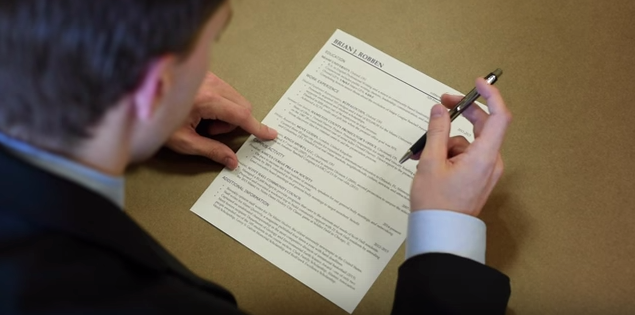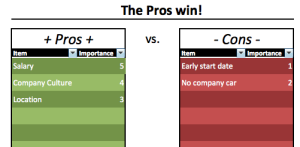I’m not going to mess around with some built up introduction. It’s this simple: getting internships and jobs is extremely competitive. Companies routinely get thousands of job applications, which means they have the power to be hyper-selective in who they hire.
So how do give yourself the best chance of getting noticed among the crowd? Well, this involves many different aspects.
But, by avoiding the resume mistakes below, you will gain a big time edge on the other candidates who commit these errors and thereby eliminate themselves. By avoiding these mistakes, you increases your chances of getting your resume noticed and receiving interviews.
Let’s get to it.
10 Common Resume Mistakes
1. No keyword matches. When thousands of other applicants and you submit your resume online, organizations use software to scan every uploaded resume and find the keywords they want.
If your only strategy is to submit your standard resume and hope by blind luck that it gets noticed, you’re way too optimistic. Once you realize your lack of strategy doesn’t work, it may be too late to get hired.
Solution: Do some research by looking at the job description. Then, add the main keywords from the job description onto your resume—where it makes sense, of course. If the job description is short or unavailable, a secondary option is to research and include keywords from the company’s website.
When you add keywords to your resume, the organization’s software scanner is more likely to choose your resume for a future interview.
2. Resume is unspecific to the job description. Human reviewers can also tell when an applicant has a general resume that looks like a factsheet. If you didn’t put in the effort to customize your resume to the specific position, they will quickly decide that you’re not the right fit.
Solution: Make a customized resume for every job you apply to in a different field.
For example, if you apply to a marketing, finance, and a sales position, you’ll want to customize three different resumes. Customizing a resume means changing the experiences and resume lines to better fit the type of position.
A crucial part of resume writing is understanding the audience and then making your best pitch to them.
3. Only meet minimum qualifications. It’s great when you fit the major and the minimum GPA requirement for a job. But, if that’s all you have, then you’re not going to get the position. This is because superior candidates will also meet the requirements and bring more to the table.
Solution: Eliminate the fluffy phrases that block your resume from excelling. Instead, use specific resume lines that market yourself in the best way possible.
Include an interesting activity that makes you different, such as: having a blog with 2,000 readers a month, performing the lead role in a play, winning a chess tournament, or whatever it is for you.
If you have a couple of years before you go through the full-time job search, make it a priority to do a unique experience or activity to set you apart.
4. Questionable internet presence. Your first thought is probably to hide the Facebook pictures that show you drinking at a frat party. It’s true that organizations wouldn’t look kindly on those pictures, but what’s arguably worse is a lack of internet presence.
You can assume every organization is going to Google search your name. And if the recruiter finds no results, then they will question your credibility and trustworthiness. Not having some type of internet presence in 2015 is a red flag.
Solution: Influence the Google search results by developing a positive digital footprint. You have more power over the search results than you think.
For example, TakeYourSuccess.com is the first result for a Google search of “Brian Robben.” The second result is my LinkedIn profile. And the third result is my Twitter account.
Establish your digital footprint by creating a personal website or blog, or writing professional content on medium.com, and making a professional Twitter profile.
5. Improper formatting. Recruiters will reject candidates who have a resume with too much bold or italics, lines everywhere, uncalled for blank space, or any other formatting error. With so many resumes to analyze, they won’t waste their time on one that’s hard to read.
And other times a resume looks beautiful, until it’s uploaded and the formatting gets messed up, which also will result in rejection.
Solution: A simple format with excellent content is more valuable than a beautifully designed resume with weak content. However, design your resume with the mindset of the person viewing it.
Use the bold or italics sparingly to highlight key phrases. Eliminate underutilized blank space. And do some usability tests with those around you to see what version looks most appealing and organized to them.
To protect yourself from a format upload problem, convert your resume to a PDF before you upload. This way you know your resume is going to look the same no matter the device or computer.
6. Includes typos. Maybe the most egregious error of all resume mistakes is having a typo. This error is highlighted because it’s one of your first impressions with the organization.
The thought goes if you’re not diligent with your resume, how can the company trust you to be careful with important work. A typo can overshadow the positive you can bring to their organization.
Solution: Ditch the spell check and grammar check by getting old school.
First, print out your resume and grab a pen to walk through each line checking for errors. As you do this, read the document out loud. If it sounds funny, odds are the recruiter will feel the same way when they read your resume.
Second, look up the spelling of unfamiliar or tricky words that have the potential to be incorrect. This will take a maximum of five minutes.
Third, give your resume to a trusted friend or professor and tell them to mark any typos or questionable aspects.
Spending the time to ensure a typo-free resume won’t get you the internship or job, but the payoff is you won’t shoot yourself in the foot.
7. Lack of numbers. Recruiters are strictly looking for candidates who can provide value to their organization if hired. When you don’t have statistics of your “excellent results” at a previous work experience, these results are hard for the recruiter to believe.
Think about it yourself, what resume line looks more impressive to you:
1) Excellent results in sales and building client base.
2) Exceeded sales quota by 127% while adding 7 new client accounts.
Solution: Take the opportunity to quantify every detail you can on your resume. Percentages, numerical comparisons to a previous year, and any positive figure will improve your resume.
If you’re presently in a position, then it’s acceptable to use projections and estimates. But, be sure to update these lines when they come to fruition.
8. Too little or too much information. Some resumes fail by only extending three-fourths of a page, and others fail by having two full pages with every activity the applicant has ever done.
The short resume doesn’t give recruiters enough information and leaves off interesting details that would have helped the candidate. And the two page resume shows a lack of concision and organization.
Solution: Make your resume a one-page document with text extending from the top to the bottom. This one-page structure will help you balance your impressive experiences while making every word on the resume count.
The following two resumes mistakes aren’t from the document itself, but what you do with your resume.
9. Apply for multiple positions in one organization. Want to look like a desperate applicant with no other options? Then apply to multiple positions within the same organization.
This looks bad to companies because you come off as being hopeless and indecisive of what you want. Organizations are looking for confident and decisive candidates, not the former.
Solution: For a safe rule, apply and submit your resume to only one position at each organization. In unique situations, it may be acceptable to apply to two positions in different cities, but that’s rare and could still confuse the hiring manager.
Spend the extra time that would have gone to more applications, to write a better resume and prepare your interview answers.
10. Only blast your resume on job boards. Because it’s easy to apply 50 jobs in under an hour, some candidates think they’re beating the process by working smarter, not harder. But, the reason they’re wrong is because the rest of the world does the same thing.
This method of job hunting is similar to playing the lottery. And how many times have you won the lottery? Exactly.
Solution: Uploading your resume and applying to companies through your university’s job board is a good move. However, don’t stop there. Get your networking on.
Start calling everyone you know who may be able to help your job search. This list includes your friends, parents, professors, and whoever else you have a relationship with. Tell them the industry, the specific companies, and what job you want.
Go on to ask employees who work at the organization you want to for coffee. Understand how they got the position and what advice they have for you (never ask them for a job). The more people you get in contact with, the greater chance they can help you, or they know someone else who can help.
Since 99% of candidates don’t make the extra effort to network in this way, you are sure to find success.
Related: 11 Common Interview Mistakes You Don’t Know You’re Making




It is a very informative post, job seekers must have a look at this post in order to avoid this mistake while building their resume.
Exactly!
My friends who work at https://professionalresumesolutions.com confirms that this mistake is essential!
Sweet!
Nice points you have there. Most importantly ,job seekers really need to sit down and go through their resume before submitting them. Nobody will give you a job with a mistake riddled resume.
And spell check often isn’t enough. The applicant needs to go through every word a few times at least.